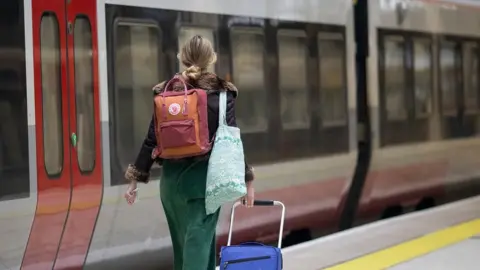Train drivers to strike again on FA Cup final day
 EPA
EPATrain drivers are set to strike again, including on the day of the FA Cup final, as part of a long-running row over pay, the Aslef union says.
As well as striking on 3 June, members will walk out on 12 May and 31 May.
It comes after the union rejected a fresh offer from 16 train firms, including a 4% pay rise for two years in a row and changes to conditions.
The organisation which represents train companies said the walkouts were "totally unnecessary".
The action is expected to cause major disruption across large parts of the country's railways, with some 13,000 drivers striking over the three days.
The first day of strike action on 12 May is the day before the Eurovision Song Contest final in Liverpool.
The government said the strike would affect Ukrainians trying to get to the event, with the UK hosting on behalf of Ukraine due to the war.
On 3 June, thousands of football fans are set to travel to Wembley Stadium in London as Manchester United take on their rivals Manchester City in the FA Cup final.
Drivers at Avanti West Coast, which is the main direct train service from Manchester to London, are set to strike that day, meaning most fans will have to travel by road.
Both football clubs are assessing the situation and liaising with the Football Association (FA), with each side expected to sell 30,000 tickets for the game.
Other events affected by the 3 June strike include Beyoncé's Renaissance tour concert at Tottenham Hotspur's stadium in London, the England men's cricket team playing Ireland at Lord's and the Epsom Derby.
The Rail Delivery Group said its pay offer was "fair and reasonable" and would give a rise to train drivers "whose average salary is already £60,000 a year".
The other 14 train companies that will see walkouts are:
- Chiltern Railways
- CrossCountry
- East Midlands Railway
- Great Western Railway
- Greater Anglia
- GTR Great Northern Thameslink
- London North Eastern Railway
- Northern Trains
- Southeastern
- Southern/Gatwick Express
- SWR depot drivers
- SWR Island Line
- TransPennine Express
- West Midands Trains
Mick Whelan said the latest offer from the train companies, which was presented to the union by the Rail Delivery Group on Wednesday, was "risible".
He said the proposal was "clearly not designed to be accepted" as it did not keep pace with the cost of living, which soared by more than 10% in the year to March.
"The blame for this action lies, fairly and squarely, at the feet of the employers who have forced our hand over this by their intransigence," Mr Whelan said.
But the Rail Delivery Group (RDG), which represents train companies, said the action was "totally unnecessary and will only heap more pressure on an industry already facing an acute financial crisis".
The latest strike dates come after months of disruption on the railways. Aslef train drivers have walked out on eight previous occasions, while strikes by rail workers at the RMT union have had a major impact on services.
The RMT is currently considering its latest pay offer from train companies and is consulting its members.
The RDG said its two-year offer to Aslef would see drivers get a backdated pay rise of 4% for 2022 and a 4% increase this year.
The RDG has previously said the offer would see the average salary for a driver increase from £60,000 per year to £65,000 by the end of 2023. 10 years ago it was £44,985.
But the deal was also contingent on "common-sense" changes to working conditions being agreed.
These included changes to the methods used for learning new routes and a "Sunday Commitment Protocol" requiring drivers to be contractually committed to working Sundays.
As well as striking, Aslef said its members would stop doing non-contractual overtime from 15 May to 20 May, as well as on 13 May and 1 June.
